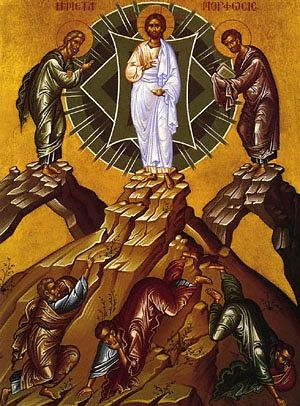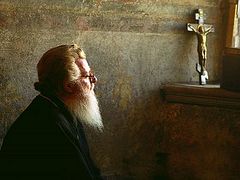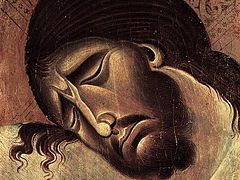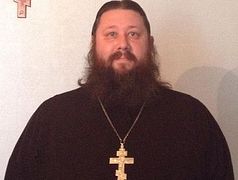
I am a firm believer that Orthodox Christianity, at its best, is local. The word local may be troubling to some, but let me assure you that I do not have in mind local in the sense of congregationalism. That is not Orthodox; congregationalism it is not historic Christianity in the least. So what do I mean by that? The way I like to describe it is by referencing one of the great feasts of the Church, the Transfiguration of Christ (celebrated on August 6th). Christ revealed his glory to Peter, James, and John on Mount Tabor and his flesh shone forth with the Light of the Kingdom of God — even his clothes became whiter than any fuller could make them. Not even Oxyclean could have made them more brilliant, for they shown with his light. The fact that the physical world around Christ participated in his transfiguration is the key here.
Too often we Orthodox concentrate on preserving our ethnic identities, about which I’ll write in a moment, but we miss something fundamental. We are to transfigure the world which requires us to live in the space and time that God has placed us in. Our job is not to colonize the new world. Our job is the transfigure it with the Gospel of Christ, with the Orthodox Faith. The big picture remains the same, but countless little details will be different — and that is right.
Let me give a couple examples of what that might mean. At Pascha (Easter), it is the common Middle Eastern custom to have lamb in the form of kibbee at the principle meal. It is delicious and I love it, especially raw. The Greeks have roasted lamb that day. It points to the Lamb of God, of course, but it is also the breaking of the lenten fast with meat which we have not had since the beginning of Great Lent. But, I’m a Texan. Lamb is not nearly so common a meal as it is in the Mediterranean. Our large celebratory meals are mostly done with barbecued beef brisket, mesquite smoked and delicious. That is a perfect appropriation by the Church to the local culture in her life.
Another example has to do with music, and here I may well offend some sensitivities. In the West, choral music has been used for worship for many, many centuries, and why not? Choral music was taken up by the Russians and developed into a magnificent tradition. Many of the Russian settings for Orthodox choral music have been translated into English so that we may use them. And, indeed, many of the Byzantine hymns have been arranged to be sung chorally. What a tremendous blessing to the Church in America! And while I enjoy “authentic” Byzantine chant, I also know that it is quite true that most Americans cannot hear the quarter and eighth tones that characterizes mature Byzantine music. I rather lament that we are losing the more “Americanized” Byzantine chant that we have been using for so long. It was a wonderful adaptation of the authentic tones to what is more natural to American ears, and it is beautiful.
To be local is to look for all that is good, and lovely and precious that is right here before us and bring that into the life of the Church. This includes music and food, and so many other things. Even iconography should in the long run develop and beautiful line that is unique to our eyes and yet fundamentally in harmony with that which is found the world over. There must be real love and charity involved with this. All too often we can fall into a trap of thinking that everything that is western is evil (how often have I read such things!). Just because something has been abused or misused does not render it evil or unfit for the glory of God. Remember… even our Lord’s clothes were transfigured!
What about communities that are largely peopled by recent immigrants? Those communities must be allowed to live the faith as they have experienced it all their lives. They are an exception. And in all of our parishes our ethnic heritages must be cherished and loved because we learned the faith from our fathers and mothers from within the context of that culture. This will necessarily include foods, and dances, and all sorts of things. And yet, I would caution that all the ethnic heritages of our faithful must be respected and cherished in our foods, celebrations and experiences. I have told my parish in the past that without having had my father, I would have nothing to give them. And he needed his father to give to him and so on, back for generations. They are receiving not only from me, but from him and the communities that formed him and my family. In a very real sense, they are on the receiving end — in the Orthodox Church — from the English. I cannot pretend to be what I am not without becoming nothing at all. I love, appreciate, cherish and admire the Middle Eastern culture and have learned so much from it, but my own must likewise be held in equal honor. And so all ethnic heritages should be honored and cherished in the Church. And they all need to be transfigured in Christ.
But genuine immigrant communities can only exist for little more than a one generation or else they will die, because while their children will understand something of the old country’s life and experience, they will also be Americans by education and cultivation in schools, friendships, and other ways. Each succeeding generation will be further from the old and more decidedly oriented towards the new. The Church must care for those who have recently immigrated and understand they have particular needs and tend to them. But these needs must be the exception to the work and life of the Church here in America. We shall not be immigrants for more than one generation. The Winfrey family came here in the 1630s and so by 1680s we ceased being immigrants. This will happen to all of us and it is right, though many are very uncomfortable with that knowledge.
Having written this, I must add that living the Faith in a local manner, in a real incarnate sense, must be done largely unconsciously. We are not supposed to be constantly fretting whether or not how we are responding corresponds to what done in the old countries, or whether or not this is a good local analog. The Faith is far more free and flexible than that. What we truly need to make the Church local are clergy who are trained firmly and solidly within the Tradition of the Church and who love where God has placed them. We priests must have been formed within the Tradition so that it is second nature to us. We priests must love all of the people around us, whether or not they are from our tribes or even part of our parishes. We are to plant the Gospel and Church amidst all those who live around us. In this way we can correctly transfigure the local culture into a true manifestation of the Kingdom of God, taking the best of what we find and glorifying it in Christ.
Let us learn, then, to love freely. Let us learn to look for what is right and beautiful instead of always trying to find fault and judge what is around us. When we learn humility and charity, we shall be able to transfigure all things in Christ who is himself the Light of this world.



